Farming must change. Diets must evolve. Southern Europe is at risk. And disaster looms if EU leaders don’t act after June’s election.
By Zia Weise
March 11, 2024
BRUSSELS — Act now or climate change will wreak catastrophic damage on Europe.
That’s the blunt message scientists sent to the European Union’s leaders on Monday in the first-ever report on climate risks facing the bloc from the European Environment Agency (EEA).
The EEA, an EU body conducting independent research to inform policymaking, warned that the bloc is unprepared for the effects of climate change even if the world manages to keep global temperature rise to 1.5 degrees Celsius, as set down in the Paris Agreement.
Every extra tenth of a degree will bring more coastal floods, yearslong droughts and scorching heat spells, the researchers said, meaning Brussels and EU governments must quickly accelerate preparations to protect lives and livelihoods.
“If decisive action is not taken now, most climate risks identified [in the assessment] could reach critical or catastrophic levels by the end of this century,” the report’s summary says. “Hundreds of thousands of people would die from heatwaves, and economic losses from coastal floods alone could exceed €1 trillion per year.”
With elections on the horizon, EEA director Leena Ylä-Mononen expressed hope that the report would be “taken seriously by the next European Parliament and the Commission.”
Here are five things to learn from the EU’s first climate risk assessment.
1. A post-election plea: Ready Europe for climate change
Preparing for climate change requires vast investments over decades, far beyond the confines of Europe’s electoral cycle, but the EEA report leaves no doubt that action must be taken now.
Decisions made in the coming years — by lawmakers elected and officials appointed following June’s EU election — will determine what risks Europeans will face in the 21st century’s back half.
“This deserves to be among the top priorities of the next policy cycle,” Ylä-Mononen said.
The researchers assessed 36 climate risks in five thematic areas — ecosystems, food, health, infrastructure, and economy and finance — finding that 21 of them need greater preparation now. Eight were categorized as particularly pressing. Each chapter comes with a set of policy recommendations.
“Each of these risks alone has the potential to cause significant environmental degradation, economic damage, social emergencies and political turbulences,” the report reads. “Their combined effects are even more impactful.”
The European Commission, the EU’s executive arm, will offer its reaction to the document on Tuesday. According to a draft seen by POLITICO last week, the missive mainly urges EU capitals to act and contains few concrete suggestions. It does offer an ominous warning, however, that water scarcity could spark conflict within Europe.
2. Restoring nature isn’t optional
The need for action is most acute in Europe’s natural ecosystems.
Coastal and marine regions are already facing “critical” threats, the assessment warns, as climate change is exacerbating unsustainable management practices and industrial pollution.
Healthy ecosystems and biodiversity aren’t just nice to have — ecosystem degradation quickly turns into threats to human health, water supply and food security.
Luckily, the EU already has plenty of tools at its disposal to rehabilitate natural areas, so the report mainly urges Brussels and member countries to implement existing or upcoming laws — specifically the much-debated Nature Restoration Law.
The law, which aims to rehab 20 percent of the EU’s land and sea by 2030, faces a tricky final vote among EU countries after passing narrowly in the European Parliament.
The rules had drawn the ire of conservative parties claiming to protect farmers from more stringent environmental rules. But according to the report, the EU needs to go the other way and clamp down on agricultural pollution.
3. Farming has to change — as do diets
The next Commission can’t keep handling protesting farmers with kid gloves.
“EU policy and governance has a critical role to play” in making food production sustainable, the researchers write, adding: “Reducing pollution from agricultural and industrial activities should be a priority for protecting Europe’s ecosystems under climate change.”
Farming in general will have to adapt to warmer temperatures and more erratic rainfall patterns to ensure Europe’s food security.
“Crop production is already facing substantial climate risks in Europe as a whole,” the document says, stressing the potential for shortages and food price hikes.
In general, the Continent “faces a growing risk of megadroughts that span large regions and last for several years, and that are even more severe than recent drought events in Europe.” That will endanger people’s health, food production and manufacturing, not to mention energy and water supply, river transport and ecosystems.
Europeans could tackle water scarcity in part by shifting toward more plant-based diets, the researchers suggest, as it would “reduce freshwater consumption for food production.”
The bloc’s Common Agricultural Policy (CAP) needs reforms to incentivize more sustainable farming practices and switch to more drought-resilient or less water-intensive crops, they add.
4. Europe can’t wait to protect itself from rising seas
With seas rising only a few millimeters a year, protecting Europe’s shorelines might not seem like an urgent problem — and the report acknowledges there haven’t been any massively destructive coastal flooding events recently.
“However, the accelerating pace of sea level rise and the exponential increase in the resulting flooding risks require more action now,” the researchers warn. Coastal flooding and storm surges will become more frequent and more severe, it adds, “with potentially devastating impacts on Europe’s population, infrastructure and economic activities.”
A high level of global warming could cause more than €1 trillion in annual flood-related economic damages by the end of the century, the assessment found.
Notably, coastal communities — which include major EU cities like Amsterdam — face a growing risk of saltwater intrusion, adding to Europe’s water scarcity woes.
And many of the EU’s outermost regions — like France’s Mayotte in the Indian Ocean or Portugal’s Azores — are especially vulnerable to sea-level rise.
5. Southern Europe is hit hardest
The continental region most vulnerable to climate impacts — particularly extreme heat and drought — is Southern Europe.
Southern European countries already face a “critical” risk of crop failures or bad harvests and “substantial” threats to their energy supply due to hotter temperatures and prolonged droughts, the report warns.
Human health is more at risk in the south — and not only because of the heat itself. The smoke from frequent wildfires is a “major health threat,” and disease-carrying mosquitoes now call the region home.
“Southern Europe is now warm enough for mosquitoes to transmit formerly tropical diseases, including dengue and chikungunya,” the researchers write.
Many of Europe’s southern region also feature higher-than-average rates of unemployment, poverty and emigration, a factor that makes adapting to climate change trickier.
Accordingly, Southern Europe’s economies and financial stability face significant risks. Heat waves tend to lower productivity; climate disasters “can result in reduced tax revenues, increased government expenditure, lower credit ratings and increased cost of borrowing.”
Overall, the assessment found that southern countries are “hotspots” for climate risks including energy system disruption due to heat and drought, water scarcity affecting economic activity and crop yields, and wildfires threatening ecosystems and housing.
We remind our readers that publication of articles on our site does not mean that we agree with what is written. Our policy is to publish anything which we consider of interest, so as to assist our readers in forming their opinions. Sometimes we even publish articles with which we totally disagree, since we believe it is important for our readers to be informed on as wide a spectrum of views as possible.
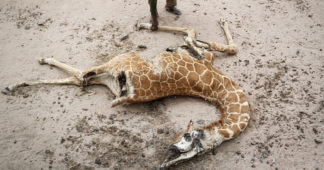 UN issues ‘bleakest warning yet’ on impacts of…
UN issues ‘bleakest warning yet’ on impacts of… Greece exposed to increased risks from climate…
Greece exposed to increased risks from climate…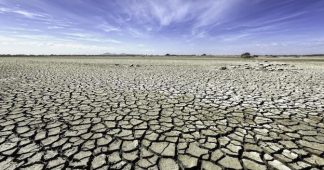 IPCC steps up warning on climate tipping points in…
IPCC steps up warning on climate tipping points in…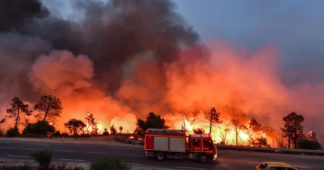 UN announces ‘climate breakdown’ after record summer heat
UN announces ‘climate breakdown’ after record summer heat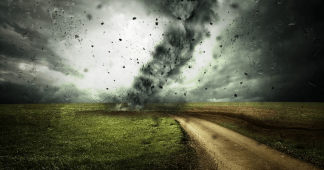 The world is ‘on the verge of the abyss’, says UN
The world is ‘on the verge of the abyss’, says UN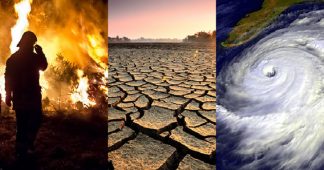 Climate crisis: Over 200 health journals urge world…
Climate crisis: Over 200 health journals urge world…





